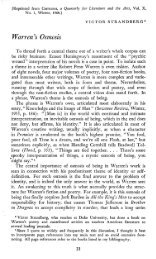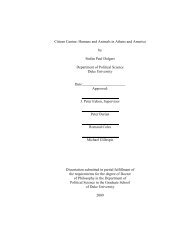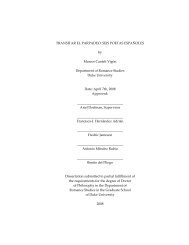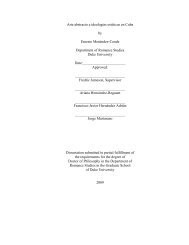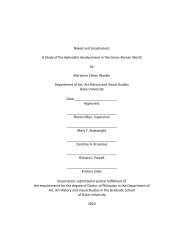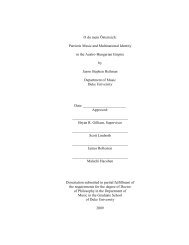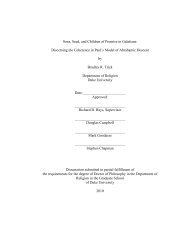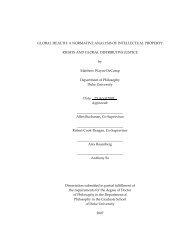View/Open - DukeSpace - Duke University
View/Open - DukeSpace - Duke University
View/Open - DukeSpace - Duke University
Create successful ePaper yourself
Turn your PDF publications into a flip-book with our unique Google optimized e-Paper software.
of engaging in “immoral” sexual acts. Ghosts are thus suspended between being harbingers of<br />
death or destruction and agents of social transformation (Zeitlin 1997). In this sense, Lan Yu’s<br />
spectral being symbolizes both the destructive and liberating consequences of embracing<br />
homoerotic desire. His ghost problematizes the demise of “facing a homosexual identity” at a<br />
time where same-sex relations were still criminalized and pathologized (32). However, it also<br />
illuminates how Lan Yu was able to liberate himself from the mental frustrations that plague gay<br />
people when they force themselves to conform to heterosexual ideals.<br />
The novella ends with a luminous and almost holy vision of Lan Yu smiling and bathed<br />
in “chrysanthemum-orange sunlight” as he walks towards Han Dong (32). This imagery of Lan<br />
Yu as a sanctified presence coupled with Han Dong’s prayers to God to forgive him for “falling<br />
in love with someone he shouldn’t” and having “an affair … considered preposterous, shameless,<br />
and decadent on Earth” reveals feelings of optimism mixed with a hollow sense of inevitable loss<br />
(32). Moreover, the fact that Han Dong becomes religious by converting to Christianity and the<br />
story’s plain indication that “God [has] accepted [him], a homosexual, into His flock” to absolve<br />
him of sin criticizes the pervasive political and religious discourse that punishes homosexuals<br />
both in life and death (32). These descriptions affirm the legitimacy of same-sex relations as<br />
“pure, innocent, and eternal,” contesting the public misconception of homosexuality perpetuated<br />
by hegemonic patriarchal values and political discrimination (32). By presenting a revelation that<br />
unfolds through a dream, Beijing Comrade’s novella shows that dreams have both a hermeneutic<br />
and therapeutic function. When Han Dong is awakened both concretely and figuratively, his<br />
spiritual acknowledgment of homosexual desire corresponds to a process of self-knowledge that<br />
is liberating and redemptive, embodied by the enlightened dreamy figure of Lan Yu.<br />
Chapter One | 42



